NEWS: How S.C. lawmakers can help to make health care better
NEWS BRIEFS: Hundreds of teaching positions vacant in S.C.
COMMENTARY, Brack: State Dems say they’ll retake state Senate; GOP says phooey
SPOTLIGHT: Conservation Voters of South Carolina
FEEDBACK: Get it right: Hoosiers, not Indianians
MYSTERY PHOTO: Big field
S.C. ENCYCLOPEDIA: Pawleys Island
NEWSBIG STORY: How S.C. lawmakers can help to make health care better
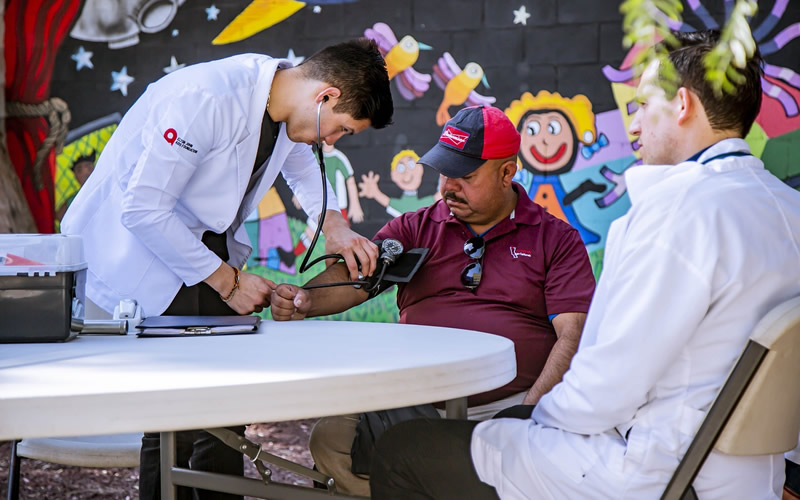
By Lindsay Street, Statehouse correspondent (updated 8/17/19) | In some ways, it’s easier to define how health care is changing by how it isn’t: It isn’t going to become more physician-centric.
“Right now, we provide care in a very delayed manner that is convenient for the doctor but not in a real-time way that is convenient for the patient,” Prisma Health Care Coordination Institute President & CEO Angelo Sinopoli of Greenville told Statehouse Report.
So, medical professionals like Sinopoli are calling on the Statehouse to help their industry evolve.
 Sinopoli was one of scores of health care stakeholders who participated in a recent report focused on the state’s health care workforce and how to meet the industry’s current and future demands. The S.C. Institute of Medicine & Public Health released its study on the evolving health care workforce study in June.
Sinopoli was one of scores of health care stakeholders who participated in a recent report focused on the state’s health care workforce and how to meet the industry’s current and future demands. The S.C. Institute of Medicine & Public Health released its study on the evolving health care workforce study in June.
“There’s a whole spectrum of workforce that is not produced today at a level that South Carolina is going to need going forward,” Sinopoli said. “This (report) is a unique opportunity for South Carolina … The key is going to be to get the delivery system — the physicians and the payers and the educational system — aligned in terms of what our future health care system needs to look like.”
According to the report, South Carolina is experiencing growing pains that much of the nation is experiencing: getting health care to the patient in better ways that include everything from telehealth to non-traditional aids to health, like a handyman who can make a home more accessible to an aging patient. The report outlines a variety of solutions from best practices, including some that can come from state lawmakers like tax credits for education.
“It’s a real, real challenge for us that we have to come together and try to address,” Sen. Thomas Alexander, R-Oconee, said. “Health care access and availability is so important for the well-being of our citizens.”
The report includes input from more than 60 stakeholders who focused on prevention, community settings and the social-environmental determinants of health and their implications for the workforce.
Essentially it all boils down to this: “We have to change how we deliver and view health and health care,” IMPH Senior Director of Strategic Engagement Megan Weis of Columbia told Statehouse Report.
Weis said the industry is being strained by rising costs, the need for integrated health and primary care, and changes in paying for individual services and lump-sum services. And those stressors are happening at a time with increased cases of sexually-transmitted diseases, obesity, opioid abuse and other behavioral health issues, she said.
“We live in a state that most of the lists that you see we are either at the bottom or the top,” Weis said. “But we are also on the forefront of initiatives like the one we just led … Our state is coming together to address these challenges and having health systems, academia, payers, nonprofits community organizations — everybody at a table moving forward is where we are really shining.”
She said the blueprint laid out in the June report will allow the state to tackle any current or future issue.
What lawmakers can do
The report urges action from hospitals, teaching institutions, bureaucrats and lawmakers. Weis said the state can provide a 24-hour caregiver hotline, encourage research initiatives for medical students, and aid with data sharing among big health systems.
The report estimated that in our state of 5 million people, there are more than 770,000 people caring for a family member or friend. IMPH is already working seeking to work with the state’s Office on Aging on developing a caregiver hotline.
The report also encouraged the state legislature:
- To continue to fund high school-level health career academies, to use of lottery funds to support medical education for minority and rural students, and to study low- or no-cost training and career counseling programs for direct-care workers;
- To support improved pay and reimbursement for behavioral health professionals; and,
- To aid in the diversity and training of more community-based professionals and specialized clinicians, and to fund incentives for health and human services professionals to receive education on screening tools for social determinants of health.
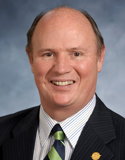
The June report said tax credits also should be explored to encourage entrance into the future workforce. Alexander said he sees lawmakers’ role as helping professionals get the training they need. In 2019, he introduced and successfully passed S. 314, an income tax credit for physicians, advanced practice nurses and physician assistants who serve as a student-guides during clinical rotations.
“Tax incentives are one way to level the playing field for public institutions trying to compete with private or for-profit entities that can afford to pay preceptors for accepting students,” the report said.
Alexander said he is reviewing further action for 2020.
“It’s going to be a process. (The evolving health care workforce) won’t be resolved in a year but we need to make sure that we are looking forward and trying to the best of our abilities to work on health care workforce issues, especially as we continue to have an aging population. It’s going to be in heavier demand,” Alexander told Statehouse Report.
He added that focusing on rural health, which the report included, is “an even greater need.”
- Have a comment? Send to: feedback@statehousereport.com
Hundreds of teaching positions vacant in S.C.
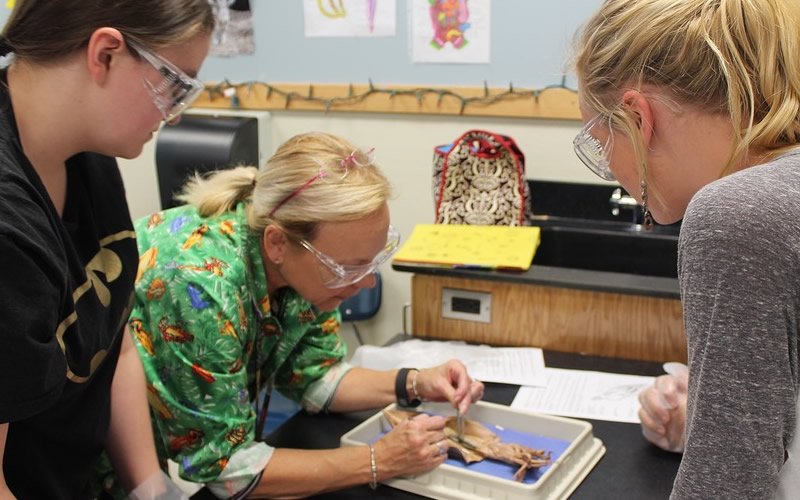
By Lindsay Street, Statehouse correspondent | South Carolina’s public schools have 991 open positions with just days left before school starts, according to information compiled by teacher grassroots group SCforEd.
By law, schools must open before the third Monday in August, and each district sets its own calendar.
The information was gathered from district job portal sites, the group said. See the full list here.
The average number of vacant positions per school district is 12.2. Here are some of the school districts with the largest number of vacancies:
- Beaufort County has 72 vacancies; its starting salary is $39,928 (school starts Aug. 19);
- Charleston County has 84 vacancies; its starting salary is $38,897 (school starts Aug. 21); and,
- Richland One district has 99 vacancies’ its starting salary is $39,260 (school starts Aug. 21).
In the last few weeks, districts have halved the number of open positions, according to the study. In early July, there were 1,726 vacancies. At that time, Richland One had 304 vacancies. Another update to the data is planned for Aug. 18.
Why does this matter? SCforEd organizer Dottie Adams of Columbia said every vacancy stresses existing teachers, the administration and, ultimately, the school district.
“That represents the number of classrooms that won’t have a teacher … Some of those positions are representing 25 to 35 kids that won’t have a permanent teacher on the first day,” the 19-year teaching veteran said. She is starting her fourth year of teaching eighth grade science at Hand Middle School. “It’s a systemic problem that doesn’t have a simple answer.”
Adams said she’s “excited” about the coming year for teachers as the advocacy group is in its second year.
“There is still fear of retribution, but I am hopeful that we can start to move past this teachers versus administration versus districts versus the state, and move toward a common goal of improving education,” Adams said. “There’s a lot of advocacy going on around the state that wasn’t going on this time last year.”
In other news:
![]() Fastest warming counties along coast, piedmont in S.C. The Washington Post compiled a list of county-by-county temperature increases (or, in some cases — all outside of South Carolina — decreases) since 1895. Some places around the nation saw a 2-degree Celsius increase. Oconee County warmed the least with a 0.2-degree increase. The counties in South Carolina that warmed the most were:
Fastest warming counties along coast, piedmont in S.C. The Washington Post compiled a list of county-by-county temperature increases (or, in some cases — all outside of South Carolina — decreases) since 1895. Some places around the nation saw a 2-degree Celsius increase. Oconee County warmed the least with a 0.2-degree increase. The counties in South Carolina that warmed the most were:
- Spartanburg and Greenville counties with a 0.8 degree increase;
- Charleston and Dillon counties with a 0.7 degree increase; and,
- Marlboro, Berkeley, Dorchester, Horry, Union, Marion, Laurens, Newberry, Colleton, Lancaster, Darlington and Chesterfield counties with a 0.6 degree increase. Read more.
Abortion returns early. A Senate Medical Affairs subcommittee will begin weighing the so-called heartbeat abortion ban that was passed by the House in April. The meeting is set for 10 a.m. and 2 p.m. Sept. 10 in room 105 of the Gressette building in Columbia. The proposal would ban most abortions in the state once a fetal heartbeat is detected, which is typically around the sixth week after conception.
State posts another surplus, warned to spend it on pensions. The state coffers have $350 million more than lawmakers thought they should have from the 2018-2019 fiscal year, according to a release from S.C. Comptroller General Richard Eckstrom this week. To put that number in perspective, the state spent $159 million in this year’s budget to fund teacher pay raises. Like last year’s $177 million surplus, Eckstrom released his end-of-year analysis and findings with a request: use the surplus to make a dent in the state’s pensions.
“South Carolina faces a dangerous ticking time bomb. The state retiree pension plans face a whopping shortfall of $24 billion, and I’d argue that it’s perhaps the most serious problem we face. Across the country, retirement systems which have ignored mounting pension shortfalls have been forced to take drastic measures – steep tax hikes, deep cuts in services, and reductions in pension benefits for retirees,” he wrote. “While this year’s $350 million surplus is certainly great news, we’d be foolish to once again miss this opportunity to apply some of it toward our unfunded pension liabilities.”
- You may recall the 2019-2020 year is projected to see an additional $1 billion come into state coffers — not just from the $177 million general fund revenue, but also from sources like the state lottery. Previous coverage on how lawmakers sought to spend that money in the coming year’s budget.
Senate panel to meet on USC Board of Trustees. A subcommittee of the Senate Education Committee will meet 10 a.m. Aug. 20 in room 308 of the Gressette building. The panel will discuss a bill seeking to shrink the size of the University of South Carolina’s Board of Trustees. See the agenda.
Oremus wins Aiken House seat. A Republican special primary runoff for S.C. House District 84 was won by Melissa Oremus this week. No Democrat filed for the Oct. 1 election. Barring a win by a write-in candidate, Oremus will likely head to the S.C. House representing Aiken. The seat became open after the death of GOP Rep. Ronnie Young.
Senate panel to begin talks on raising prosecution age. A select Senate committee will begin a discussion on raising minimum age where a person can be prosecuted for crimes. The current age is 17. The first meeting is 1 p.m. Aug. 20 in room 105 of the Gressette building. Agenda here.
Affordable housing strains S.C. budget. The National Low Income Housing Coalition has tabulated that the lack of affordable housing costs the state $8 billion in public assistance and charity, according to this story by WSPA. The state reportedly is short more than 80,000 affordable housing units. The S.C. State Housing Finance and Development Authority will release its own study Aug. 26.
S.C. has $2B water problem. The American Society of Civil Engineers says water systems across the state will need nearly $2 billion in repairs. The repairs are mostly needed in small, rural towns. Read more.
2020 candidate calendar
 Throughout the campaign season, we are working to keep South Carolina informed of candidate events in the state. Have an event you want us to know about? Email us at 2020news@statehousereport.com.
Throughout the campaign season, we are working to keep South Carolina informed of candidate events in the state. Have an event you want us to know about? Email us at 2020news@statehousereport.com.
Buttigieg sweeps South Carolina. South Bend, Ind., Mayor and Democratic presidential hopeful Pete Buttigieg will spend two days this weekend in South Carolina. Here are the events:
- Rural roundtable noon Aug. 17 at American Legion Hut in Hampton;
- Rural roundtable 3 p.m. Aug. 17 at Church of the Redeemer in Pineville;
- College of Charleston Bully Pulpit series 5:15 p.m. Aug. 17 at Albert Simons Center for the Arts in Charleston;
- Church service 10 a.m. Aug. 18 at Bethel AME in Georgetown; and,
- Town hall 2 p.m. Aug. 18 at Jerusalem Baptist Church in Hartsville.
Pints and Politics with Amy Klobuchar. The Post and Courier politics team will host Democratic candidate U.S. Sen. Amy Klobuchar of Minnesota 2 p.m. Aug. 17 at Tradesman Brewing in Mount Pleasant.
Pence to make S.C. stop. Republican Vice President Mike Pence will headline U.S. Rep. Jeff Duncan’s Faith and Freedom Barbecue 4 p.m. Aug. 26 at Anderson Sports & Entertainment Center in Anderson.
Sanders to host three events. Independent Vermont Sen. and Democratic presidential contender Bernie Sanders will visit the state Aug. 18 to Aug. 19. Here are the events:
- Lunch noon Aug. 18 at Brookland Baptist Church in West Columbia;
- Townhall 2 p.m. Aug. 18 at Greenview Park Gym in Columbia; and,
- Block Party “On the Hill” 3:30 p.m. at 1432 Crosshill Road, Hopkins.
Warren to talk in Aiken. Democratic presidential hopeful and Massachusetts Sen. Elizabeth Warren will host a town hall 5:45 p.m. Aug. 17 at USC Aiken Business and Education Building in Aiken.
- Have a comment? Send to: feedback@statehousereport.com
BRACK: State Dems say they’ll retake state Senate; GOP says phooey

By Andy Brack, editor and publisher | The nation’s current political volatility is leading to big dreams for South Carolina Democrats.
 They’re viewing the mess in Washington plus recent urban voting trends plus voter frustration as the perfect ingredients for political change in the South Carolina Senate, which has been firmly in the grip of Republicans since the election of 2000.
They’re viewing the mess in Washington plus recent urban voting trends plus voter frustration as the perfect ingredients for political change in the South Carolina Senate, which has been firmly in the grip of Republicans since the election of 2000.
Currently, the Senate has 27 Republicans and 19 Democrats. For Democrats to get outright control, they need to pick up five seats in 2020. For them to make the Republicans play nicer with them, they need a pickup of three seats.
“This may be one of the most expensive elections in South Carolina,” S.C. Democratic Party Chairman Trav Robertson told Statehouse Report. “We are looking at fighting in state Senate seats and trying to win in the state Senate in places that Democrats have not run in a very long time. It [the 2020 race] is going to be a tactical, strategic plan to take back the S.C. state Senate.”
Maybe. But the leader of the state Republican Party says no way, particularly in a state where the GOP controls all constitutional officers, the S.C. House and the S.C. Senate. Furthermore after 2010, GOP incumbents controlled the legislative redistricting process, which means the way districts are now drawn favor them. Incumbents also have money and influence advantages.
![]() “The Democrats have zero chance of taking back control of the S.C. Senate,” GOP state Chairman Drew McKissick said in a statement. “In fact, we expect to make even more Senate gains this cycle.
“The Democrats have zero chance of taking back control of the S.C. Senate,” GOP state Chairman Drew McKissick said in a statement. “In fact, we expect to make even more Senate gains this cycle.
“With both President Trump and U.S. Sen. Lindsey Graham at the top of the ticket, we know that Republican enthusiasm and support will be running high, which will benefit all down ballot races across the state as well.”
Then he went on to slap at Democrats by criticizing them on “socialism, higher taxes and open borders.” Just like it’s a reflex for Robertson to spank the GOP on health care, education and guns.
So let’s take a dive deeper than political talking points and sound bites. Is there a path for Democrats to retake the state Senate?
On paper, the answer is yes. While most Republican incumbents have districts with 80 percent or more of voters being white, there are a few where non-white registered voters exceed 20 percent. In the 2020 election, it’s safe to bet that non-white voters upset by plantation politics and nationalism are going to be more inclined to vote than ever before, especially if there’s a minority Democrat at the top of or sharing the presidential ticket.
Furthermore in many of those GOP seats, there are significantly more registered women voters than men. At times, the gap is 10 percentage points. With polls showing a majority of Democrats and Republicans supporting abortion rights and more gun control – and with 2018 trends showing moderate Republican women in suburbs voting for Democrats – it’s likely women will be more energized to vote in 2020 too.
![]() The state Democratic strategy to retake the Senate will clearly depend on galvanizing non-white voters, urban voters and women who are frustrated with an increasingly vitriolic politics that puts narrow interests over the common good.
The state Democratic strategy to retake the Senate will clearly depend on galvanizing non-white voters, urban voters and women who are frustrated with an increasingly vitriolic politics that puts narrow interests over the common good.
So yeah, on paper, it could work, particularly if Dems raise buckets of money.
But this academic exercise ignores pure politics. It doesn’t take into account longtime relationships in communities by GOP leaders, such as how Senate Finance Chairman Hugh Leatherman, R-Florence, has delivered for the Pee Dee. It doesn’t envision non-partisan community pride of having a home-grown politician serve as a committee chair. It doesn’t foresee how Democrats may have tarred and feathered a vulnerable GOP senator, thus making him a hometown hero and bolstering his chances.
More than likely, the 2020 election will be another sea-change election. Democrats will make gains in the S.C. Senate, but probably not enough for outright control. But if they get just three additional seats, they’ll have more power to pick off two or three moderate Republicans who don’t agree with hard-liners on everything from redistricting and education to abortion and real background checks for gun sales.
One thing is for sure: 2020 will be a wild ride for anyone running for office. Hold on.
- Andy Brack’s latest book, “We Can Do Better, South Carolina,” is now available in paperback and for Kindle via Amazon.
- Have a comment? Send to: feedback@statehousereport.com.
SPOTLIGHT: Conservation Voters of South Carolina
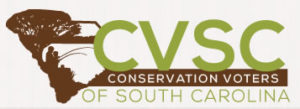 The Conservation Voters of South Carolina is a statewide nonprofit organization that fights for the Palmetto State’s air, water, land and energy through political action. The organization is bipartisan, pragmatic and effective.
The Conservation Voters of South Carolina is a statewide nonprofit organization that fights for the Palmetto State’s air, water, land and energy through political action. The organization is bipartisan, pragmatic and effective.
Through scorecards and advocacy at the Statehouse, CVSC holds South Carolina legislators accountable for their votes and actions. As a small organization that operates as a nonprofit and has a political action committee, we have a big impact. Learn more today by clicking any of the links below:
FEEDBACKGet it right: Hoosiers, not Indianians
To the editor:
![]() Loved your recent article, “Seeing 2020” from the July 10 edition of the City Paper (yeah, I’m a couple issues behind…).
Loved your recent article, “Seeing 2020” from the July 10 edition of the City Paper (yeah, I’m a couple issues behind…).
But I’m afraid one line made me cringe. “[F]ellow Indianian, Mike Pence”?!? Andy, you’re killing me, here. People from Indiana are called Hoosiers! 🙂
Misnomers aside, keep up the great work! It’s nice to have a voice of reason in the political discourse down here.
— Keegan Robbins, Mount Pleasant
Send us your thoughts … or rants
We love hearing from our readers and encourage you to share your opinions. But you’ve got to provide us with contact information so we can verify your letters. Letters to the editor are published weekly. We reserve the right to edit for length and clarity. Comments are limited to 250 words or less. Please include your name and contact information.
-
- Send your letters or comments to: feedback@statehousereport.com
Big field
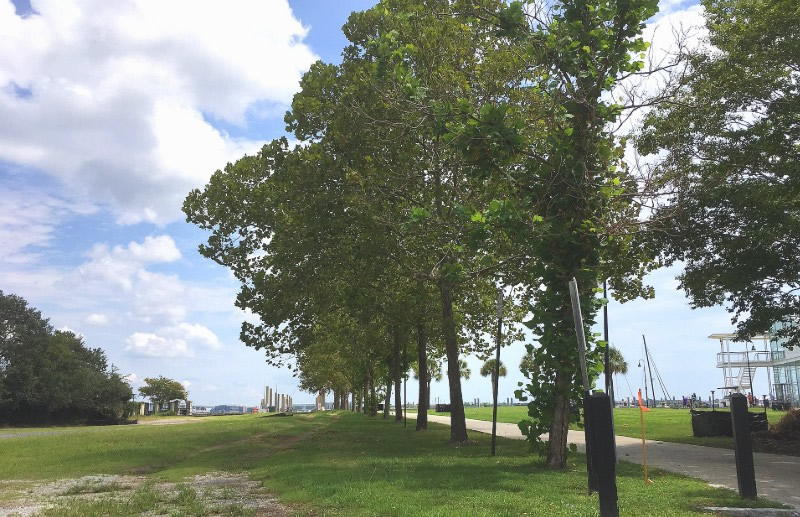
Here’s an interesting field in South Carolina, probably somewhere along the coast. What is it and why is it special? Send your guess about the location of this photo to feedback@statehousereport.com. And don’t forget to include your name and the town in which you live.
Our previous Mystery Photo
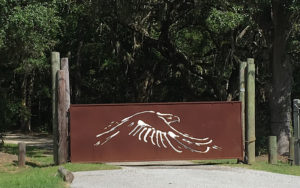 Our Aug. 9 mystery, “Rusty gate,” leads to the Avian Conservation Center at The Center for Birds of Prey in Awendaw.
Our Aug. 9 mystery, “Rusty gate,” leads to the Avian Conservation Center at The Center for Birds of Prey in Awendaw.
Congratulations this week’s avian photo sleuths: Charlie Davis of Aiken; Addison Ingle of Charleston; Daniel Prohaska of Moncks Corner; George Graf of Palmyra, Va.; Matthew Brady of North Charleston; James Gainey of Conway; Philip Cromer of Beaufort; Jay Altman of Columbia; Frank Bouknight and Ted Creech, both of Summerville; and Jacie Godfrey of Florence. Just over 20 people identified the photo correctly in our sister publication, Charleston Currents.
If there’s anyone who should have identified the gate it was Prohaska, who said, “That’s my office!” As director of development of the center, he drives through the gate daily. He shares this info:
“What began in 1991 with a single injured osprey has become a preeminent medical, scientific and educational institution preserving the sentinels of our fragile and complex natural world. The health of wild bird populations, and birds of prey specifically, is a direct reflection of the overall health of the ecosystem. Birds are the vital link between the complexities of our ecosystem and measuring the quality and sustainability of our lives.
“The mission of the Avian Conservation Center is to identify and address vital environmental issues by providing medical care to injured birds of prey and shorebirds, and through educational, research, and conservation initiatives. Over the last 28 years, the center has emerged as the premier avian center in the region and the only one of its kind in the nation comprehensively combining science, education, research, medical care, captive breeding and oiled bird treatment.
“The Center for Birds of Prey is the principal operating division of the Avian Conservation Center and is open to the public every Thursday, Friday and Saturday. For more information, visit www.thecenterforbirdsofprey.org or call 843.971.7474.”
- Send us a mystery: If you have a photo that you believe will stump readers, send it along (but make sure to tell us what it is because it may stump us too!) Send to: feedback@statehousereport.com and mark it as a photo submission.
HISTORY: Pawleys Island
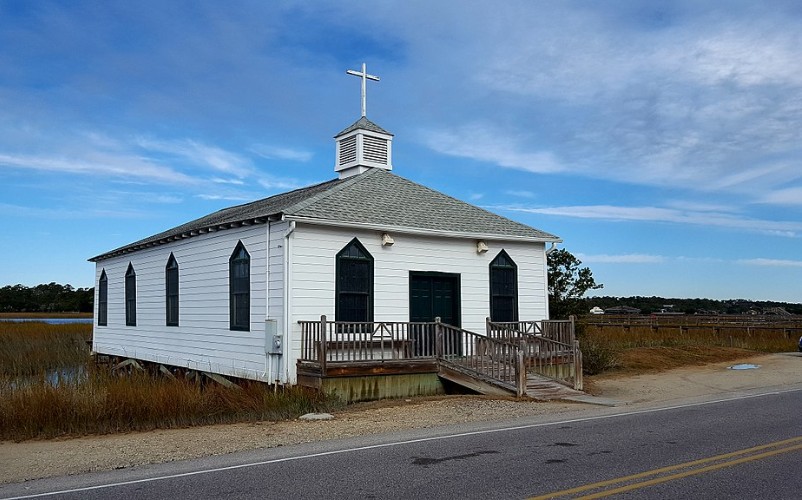
S.C. Encyclopedia | Situated on the Waccamaw Neck in Georgetown County, Pawleys Island is one of the oldest summer resorts on the east coast. In the eighteenth century rice planters, their families, and slaves stayed in cottages of cypress and pine near the saltwater to escape malaria. By 1822 cottages appeared on the island, and by 1858 eleven stood on this four-mile-long, one-quarter-mile-wide stretch of sand.
The decline of rice caused a rise in timber harvesting, and Atlantic Coast Lumber Company bought land on the neck. In 1901 the company ran a railroad from the river to the beach, bought or built houses, and created an employee retreat. Others opened homes to paying guests. Beginning in 1905, northerners bought river plantations as winter retreats.
In the early twentieth century U.S. Highway 17, connecting New York to Miami, passed through the community. The Hammock Shop opened on the highway by 1939, as did restaurants and stores. Marlow’s Store sold items ranging from caviar to flip-flops. Area residents once earned a living farming, fishing, logging, or commuting to the paper mill or to motels. In 1954 Hurricane Hazel destroyed many houses on the island, yet spurred an interest in the resort. In the 1980s plantations were developed as golf communities and many visitors made the island their permanent home. In 1985 the town of Pawleys Island incorporated. Hurricane Hugo in 1989 brought major challenges to homeowners and businesses on the Waccamaw Neck.
Pawleys retains an “arrogantly shabby” uniqueness. Creek docks, porches, and lookouts define its skyline. A mixed culture of natives and newcomers and of affluence and poverty, Pawleys has strong traditions. The spirit of the “Gray Man,” a local legend, is said to appear to warn islanders of impending storms in this barefoot paradise.
— Excerpted from an entry by Lee G. Brockington. This entry may not have been updated since 2006. To read more about this or 2,000 other entries about South Carolina, check out The South Carolina Encyclopedia, published in 2006 by USC Press. (Information used by permission.)
ABOUT STATEHOUSE REPORTStatehouse Report, founded in 2001 as a weekly legislative forecast that informs readers about what is going to happen in South Carolina politics and policy, is provided to you at no charge every Friday.
Meet our team
- Editor and publisher: Andy Brack, 843.670.3996
- Statehouse correspondent: Lindsay Street
Buy the book
 Now you can get a copy of editor and publisher Andy Brack’s We Can Do Better, South Carolina! ($14.99) as a paperback or as a Kindle book ($7.99). . The book of essays offers incisive commentaries by editor and publisher Andy Brack on the American South, the common good, vexing problems for the Palmetto State and interesting South Carolina leaders.
Now you can get a copy of editor and publisher Andy Brack’s We Can Do Better, South Carolina! ($14.99) as a paperback or as a Kindle book ($7.99). . The book of essays offers incisive commentaries by editor and publisher Andy Brack on the American South, the common good, vexing problems for the Palmetto State and interesting South Carolina leaders.
More
- Mailing address: Send inquiries by mail to: P.O. Box 22261, Charleston, SC 29407
- Subscriptions are free: Click to subscribe.
- We hope you’ll keep receiving the great news and information from Statehouse Report, but if you need to unsubscribe, go to the bottom of the weekly email issue and follow the instructions.
- © 2019, Statehouse Report. All rights reserved.















